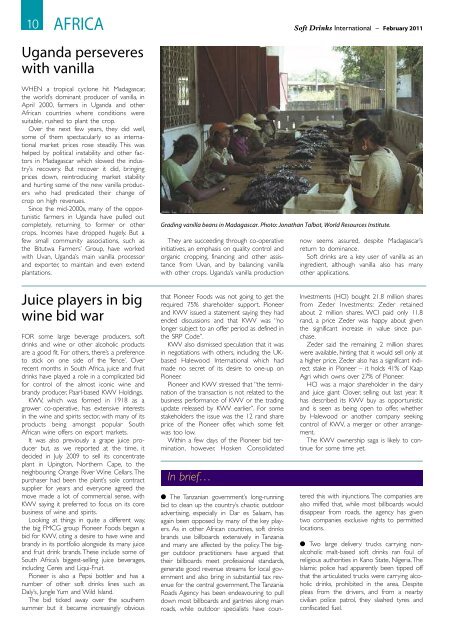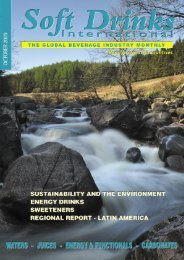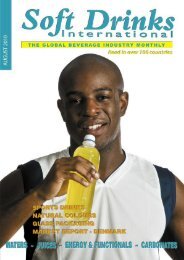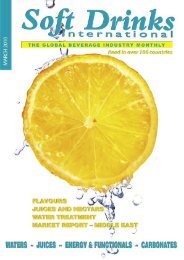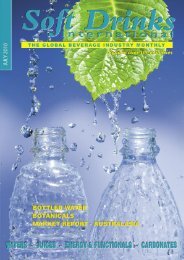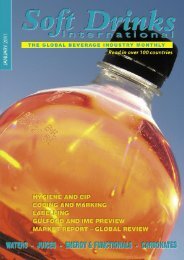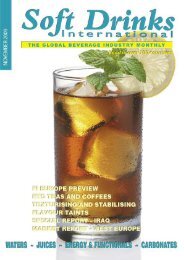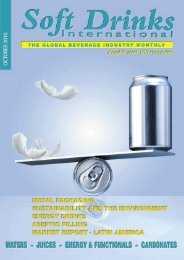Palatinose - Soft Drinks International
Palatinose - Soft Drinks International
Palatinose - Soft Drinks International
Create successful ePaper yourself
Turn your PDF publications into a flip-book with our unique Google optimized e-Paper software.
10 AFRICA<br />
<strong>Soft</strong> <strong>Drinks</strong> <strong>International</strong> – February 2011<br />
Uganda perseveres<br />
with vanilla<br />
WHEN a tropical cyclone hit Madagascar,<br />
the world’s dominant producer of vanilla, in<br />
April 2000, farmers in Uganda and other<br />
African countries where conditions were<br />
suitable, rushed to plant the crop.<br />
Over the next few years, they did well,<br />
some of them spectacularly so as international<br />
market prices rose steadily. This was<br />
helped by political instability and other factors<br />
in Madagascar which slowed the industry’s<br />
recovery. But recover it did, bringing<br />
prices down, reintroducing market stability<br />
and hurting some of the new vanilla producers<br />
who had predicated their change of<br />
crop on high revenues.<br />
Since the mid-2000s, many of the opportunistic<br />
farmers in Uganda have pulled out<br />
completely, returning to former or other<br />
crops. Incomes have dropped hugely. But a<br />
few small community associations, such as<br />
the Bitutwa Farmers’ Group, have worked<br />
with Uvan, Uganda’s main vanilla processor<br />
and exporter, to maintain and even extend<br />
plantations.<br />
Juice players in big<br />
wine bid war<br />
FOR some large beverage producers, soft<br />
drinks and wine or other alcoholic products<br />
are a good fit. For others, there’s a preference<br />
to stick on one side of the ‘fence’. Over<br />
recent months in South Africa, juice and fruit<br />
drinks have played a role in a complicated bid<br />
for control of the almost iconic wine and<br />
brandy producer, Paarl-based KWV Holdings.<br />
KWV, which was formed in 1918 as a<br />
grower co-operative, has extensive interests<br />
in the wine and spirits sector, with many of its<br />
products being amongst popular South<br />
African wine offers on export markets.<br />
It was also previously a grape juice producer<br />
but, as we reported at the time, it<br />
decided in July 2009 to sell its concentrate<br />
plant in Upington, Northern Cape, to the<br />
neighbouring Orange River Wine Cellars. The<br />
purchaser had been the plant’s sole contract<br />
supplier for years and everyone agreed the<br />
move made a lot of commercial sense, with<br />
KWV saying it preferred to focus on its core<br />
business of wine and spirits.<br />
Looking at things in quite a different way,<br />
the big FMCG group Pioneer Foods began a<br />
bid for KWV, citing a desire to have wine and<br />
brandy in its portfolio alongside its many juice<br />
and fruit drink brands. These include some of<br />
South Africa’s biggest-selling juice beverages,<br />
including Ceres and Liqui-Fruit.<br />
Pioneer is also a Pepsi bottler and has a<br />
number of other soft drinks lines such as<br />
Daly’s, Jungle Yum and Wild Island.<br />
The bid ticked away over the southern<br />
summer but it became increasingly obvious<br />
Grading vanilla beans in Madagascar. Photo: Jonathan Talbot, World Resources Institute.<br />
They are succeeding through co-operative<br />
initiatives, an emphasis on quality control and<br />
organic cropping, financing and other assistance<br />
from Uvan, and by balancing vanilla<br />
with other crops. Uganda’s vanilla production<br />
that Pioneer Foods was not going to get the<br />
required 75% shareholder support. Pioneer<br />
and KWV issued a statement saying they had<br />
ended discussions and that KWV was “no<br />
longer subject to an offer period as defined in<br />
the SRP Code”.<br />
KWV also dismissed speculation that it was<br />
in negotiations with others, including the UKbased<br />
Halewood <strong>International</strong> which had<br />
made no secret of its desire to one-up on<br />
Pioneer.<br />
Pioneer and KWV stressed that “the termination<br />
of the transaction is not related to the<br />
business performance of KWV or the trading<br />
update released by KWV earlier”. For some<br />
stakeholders the issue was the 12 rand share<br />
price of the Pioneer offer, which some felt<br />
was too low.<br />
Within a few days of the Pioneer bid termination,<br />
however, Hosken Consolidated<br />
In brief…<br />
● The Tanzanian government’s long-running<br />
bid to clean up the country’s chaotic outdoor<br />
advertising, especially in Dar es Salaam, has<br />
again been opposed by many of the key players.<br />
As in other African countries, soft drinks<br />
brands use billboards extensively in Tanzania<br />
and many are affected by the policy. The bigger<br />
outdoor practitioners have argued that<br />
their billboards meet professional standards,<br />
generate good revenue streams for local government<br />
and also bring in substantial tax revenue<br />
for the central government. The Tanzania<br />
Roads Agency has been endeavouring to pull<br />
down most billboards and gantries along main<br />
roads, while outdoor specialists have coun-<br />
now seems assured, despite Madagascar’s<br />
return to dominance.<br />
<strong>Soft</strong> drinks are a key user of vanilla as an<br />
ingredient, although vanilla also has many<br />
other applications.<br />
Investments (HCI) bought 21.8 million shares<br />
from Zeder Investments: Zeder retained<br />
about 2 million shares. WCI paid only 11.8<br />
rand, a price Zeder was happy about given<br />
the significant increase in value since purchase.<br />
Zeder said the remaining 2 million shares<br />
were available, hinting that it would sell only at<br />
a higher price. Zeder also has a significant indirect<br />
stake in Pioneer – it holds 41% of Kaap<br />
Agri which owns over 27% of Pioneer.<br />
HCI was a major shareholder in the dairy<br />
and juice giant Clover, selling out last year. It<br />
has described its KWV buy as opportunistic<br />
and is seen as being open to offer, whether<br />
by Halewood or another company seeking<br />
control of KWV, a merger or other arrangement.<br />
The KWV ownership saga is likely to continue<br />
for some time yet.<br />
tered this with injunctions. The companies are<br />
also miffed that, while most billboards would<br />
disappear from roads, the agency has given<br />
two companies exclusive rights to permitted<br />
locations.<br />
● Two large delivery trucks carrying nonalcoholic<br />
malt-based soft drinks ran foul of<br />
religious authorities in Kano State, Nigeria. The<br />
Islamic police had apparently been tipped off<br />
that the articulated trucks were carrying alcoholic<br />
drinks, prohibited in the area. Despite<br />
pleas from the drivers, and from a nearby<br />
civilian police patrol, they slashed tyres and<br />
confiscated fuel.


